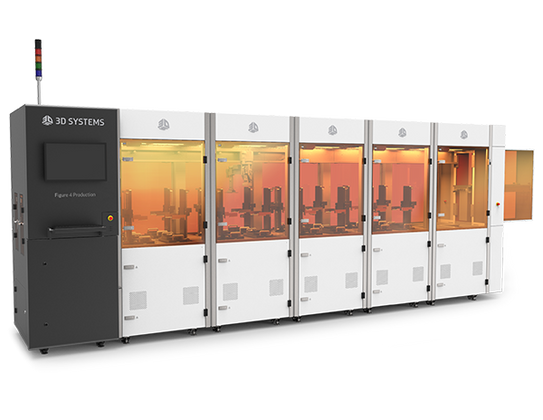3D Systems Helps Customers Ease Path to Production
Posted by Complete 3D on 11th May 2020
The first in the additive manufacturing (AM) industry to conduct and provide comprehensive, consistent materials test data - enabling engineers to efficiently, effectively evaluate AM production materials for their applications.
3D Systems announced on the 9th March that it has completed comprehensive testing for its newest Figure 4® materials against both ASTM and ISO standards. Materials are at the core of 3D Systems’ digital manufacturing solutions, and in late 2019, the company introduced a host of production-grade materials for its Figure 4 Platform – opening the door to new applications. With the release of its advanced Figure 4 material test data, the company continues to build on its “customer-first” approach to innovation and is the first in the industry to provide this level of transparency - saving customers time, reducing cost, and speeding their time to first part.
“Until this point, materials testing data provided by the industry has been incomplete for production applications and of little value to engineers accustomed to data that accompanies injection molded plastics,” said Marty Johnson, technical fellow, 3D Systems. “If an engineer is going to use any material for true production applications, they need a comprehensive set of data which meets industry standards in order to evaluate its efficacy. 3D Systems recognises how these standards help improve product quality, enhance safety, facilitate market access and trade, and build consumer confidence. Testing to both ASTM and ISO standards allows us to address a broad set of manufacturers worldwide and usher in the use of additive for true production.”
Arming manufacturers with a complete data set to properly screen a material’s appropriateness for their application enables them to immediately proceed to longer term application testing such as life testing of parts/components or higher biocompatibility ratings. As an example, electrical life testing can take anywhere from 1,000 to 4,000 hours (approximately three – 12 months) to complete including time on the testing equipment, operator time, and time to market. Before a company makes such a significant investment, they want to have assurance that the selected material is appropriate for the application. Having the knowledge of a material’s dielectric properties per industry standards beforehand saves engineers needing to conduct several rounds of testing – at approximately two weeks per material - to find a candidate to pass initial dielectric properties before going into long term life testing.
3D Systems has completed testing for its newest Figure 4 materials designed for production applications:
- Figure 4 PRO-BLK 10
- Figure 4 EGGSHELL-AMB 10
- Figure 4 HI TEMP 300-AMB
- Figure 4 FLEX-BLK 20
- Figure 4 RUBBER-BLK 10
- Figure 4 TOUGH-BLK 20
- Figure 4 MED-AMB 10
- Figure 4 MED-WHT 10.
The company has tested against an extensive set of properties which includes: long-term environmental stability, electrical data, UL94 flammability, biocompatibility, ISO mechanical properties, isotropic mechanical property tolerances, and compatibility with automotive fluids and chemical reagents. Test data for all materials will be made available on the company’s website.
These materials have unique and compelling properties that represent significant improvements in first-time print yield, heat deflection, UV stability, durability, flexibility and impact strength, while also enabling new biocompatible and direct digital production workflows. These breakthrough materials complement the company’s entire portfolio, which when combined with 3D Systems’ 3D printing technology, software and services enabled its customers to create nearly 200 million production parts in 2019 alone.
For more information about Figure 4 or 3D Printing, contact Jim at jim.collins@complete3d.co.nz.

